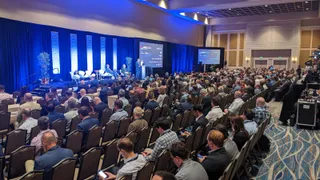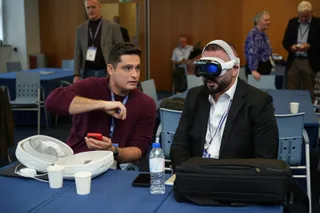TSIS Brings War Closer to Home
Contact Our Team
For more information about how Halldale can add value to your marketing and promotional campaigns or to discuss event exhibitor and sponsorship opportunities, contact our team to find out more
The Americas -
holly.foster@halldale.com
Rest of World -
jeremy@halldale.com

The ongoing Ukrainian war weighs heavily on Michael Obod every day. Having lost a friend on the battlefield, the Ukraine native understands how important it is, far beyond the daily headlines we see in the US.
But his experience shines an ultra-clear light on how important new technologies have become in military conflicts.
“Before the war, everyone in Ukraine thought simulation was a game,” said Obod, an entrepreneur whose Ukraine-based Skiftech (US headquarters Orlando) builds tactical simulation programs. “But they are very serious now and understand how to utilize it.”
That’s what brought Obod to the Training & Simulation Symposium (TSIS), a four-day showcase that annually brings military leaders into the same rooms with suppliers.
On the surface, it resembles little more than any other industry conference or event you might see in hotel ballrooms across this convention-heavy city.
However, its impact both on the businesses seeking to partner with the military and the US Armed Forces that send top leaders here can be crucial.
“We can’t fix what we don’t know is broken,” said US Navy Capt. Tim James of the Orlando-based Naval Air Warfare Center Training Systems Division (NAWCTSD). We need to be making things uncomfortable and leaning forward.”
The remarks from military leaders at the event indicate a continued evolution of military thinking. Partnering with the private industry for their technology-based products to help the warfighter has been a relatively recent development.
Walt Yates, a Marine Corps veteran who now serves as an adviser to the private sector, said the shift was out of necessity as much as anything else. “Things are moving so much faster than the government can,” he said. “By opening up to the commercial sector, they have future-proofed the government.”
Although the Covid pandemic put a damper on conferences and face-to-face interactions, the return of in-person events has helped bring back the wheeling and dealing that is common at high-profile shows.
At TSIS, a showroom placed vendors along the edges as potential collaborators kicked the tires on their offerings. The technology in the room represented both in-use products and those that will be used by the warfighter in the coming years.
“So much of the industry comes from people who have been in uniform, studying these problems,” Yates said. “Now they share ideas and the technology is coming faster than the military can assess and assemble it. There is a huge opportunity for the government to leverage these technologies.”
In a corner, JRM Technologies set up video footage and information on their infrared sensors. Ret. Marine Cedric Dendy, who represented the Hampstead, NC-based company, said working on products for the military brings with it some weight.
“This is not something we take lightly,” he said. “But it’s important to note that we are all competitive but still work together as a community. Everybody is here because they have a personal connection to the battlefield.”
The site of TSIS puts the show right in the middle of one of the defense industry’s main hubs. Orlando is home to the military simulation and training arm of all but one of the US military branches. The lone exception – Space Force – recently announced Patrick Air Force Base on Florida’s Space Coast as the preferred location for the Space Training and Readiness Command (STARCOM) headquarters.
That meant a significant showing for small businesses from Central Florida that sought to work with the military. “This gives us access to potential collaborations with the government or other big companies to do what we do,” said Bobby Torres, co-owner of Orlando-based 302 Interactive, which has worked on military contracts. “Being local, having it here, it’s huge for our business.”
Torres’ company represents a growing small business ecosystem in Orlando that has sprouted around supporting military and defense organizations. That comes as no surprise, considering the city also hosts I/ITSEC, the largest MS&T trade show in the world every November and December.
“(TSIS) is a less stressful, much more casual environment to connect with people compared to I/ITSEC,” said Brandon Naids, CEO of Orlando-based Talon Simulations. “Getting in front of acquisition managers is easier and it’s the right place to meet the right people.”
As the war in Ukraine enters its 17th month, its impact on military contractors work was felt at TSIS. Several companies said ongoing conflicts across the world crystallize the work that they do, with Dendy saying “it ups the sense of urgency, for sure.”
Talon’s Naids agreed. “Current events do play a role in the mentality of the work we do. It brings more passion into what we deliver and what we are engineering.”
But the conflict, of course, gives Obod a little added motivation. “Everybody in Ukraine wants it to end as soon as possible,” he said. “It’s difficult and it takes all my energy. But, after all of this, I understand my goal more clearly.”


